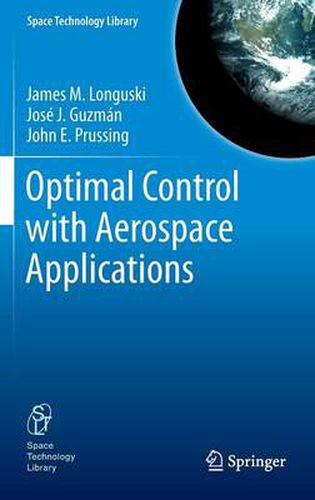Readings Newsletter
Become a Readings Member to make your shopping experience even easier.
Sign in or sign up for free!
You’re not far away from qualifying for FREE standard shipping within Australia
You’ve qualified for FREE standard shipping within Australia
The cart is loading…






This title is printed to order. This book may have been self-published. If so, we cannot guarantee the quality of the content. In the main most books will have gone through the editing process however some may not. We therefore suggest that you be aware of this before ordering this book. If in doubt check either the author or publisher’s details as we are unable to accept any returns unless they are faulty. Please contact us if you have any questions.
Want to know not just what makes rockets go up but how to do it optimally? Optimal control theory has become such an important field in aerospace engineering that no graduate student or practicing engineer can afford to be without a working knowledge of it. This is the first book that begins from scratch to teach the reader the basic principles of the calculus of variations, develop the necessary conditions step-by-step, and introduce the elementary computational techniques of optimal control. This book, with problems and an online solution manual, provides the graduate-level reader with enough introductory knowledge so that he or she can not only read the literature and study the next level textbook but can also apply the theory to find optimal solutions in practice. No more is needed than the usual background of an undergraduate engineering, science, or mathematics program: namely calculus, differential equations, and numerical integration. Although finding optimal solutions for these problems is a complex process involving the calculus of variations, the authors carefully lay out step-by-step the most important theorems and concepts. Numerous examples are worked to demonstrate how to apply the theories to everything from classical problems (e.g., crossing a river in minimum time) to engineering problems (e.g., minimum-fuel launch of a satellite). Throughout the book use is made of the time-optimal launch of a satellite into orbit as an important case study with detailed analysis of two examples: launch from the Moon and launch from Earth. For launching into the field of optimal solutions, look no further!
$9.00 standard shipping within Australia
FREE standard shipping within Australia for orders over $100.00
Express & International shipping calculated at checkout
This title is printed to order. This book may have been self-published. If so, we cannot guarantee the quality of the content. In the main most books will have gone through the editing process however some may not. We therefore suggest that you be aware of this before ordering this book. If in doubt check either the author or publisher’s details as we are unable to accept any returns unless they are faulty. Please contact us if you have any questions.
Want to know not just what makes rockets go up but how to do it optimally? Optimal control theory has become such an important field in aerospace engineering that no graduate student or practicing engineer can afford to be without a working knowledge of it. This is the first book that begins from scratch to teach the reader the basic principles of the calculus of variations, develop the necessary conditions step-by-step, and introduce the elementary computational techniques of optimal control. This book, with problems and an online solution manual, provides the graduate-level reader with enough introductory knowledge so that he or she can not only read the literature and study the next level textbook but can also apply the theory to find optimal solutions in practice. No more is needed than the usual background of an undergraduate engineering, science, or mathematics program: namely calculus, differential equations, and numerical integration. Although finding optimal solutions for these problems is a complex process involving the calculus of variations, the authors carefully lay out step-by-step the most important theorems and concepts. Numerous examples are worked to demonstrate how to apply the theories to everything from classical problems (e.g., crossing a river in minimum time) to engineering problems (e.g., minimum-fuel launch of a satellite). Throughout the book use is made of the time-optimal launch of a satellite into orbit as an important case study with detailed analysis of two examples: launch from the Moon and launch from Earth. For launching into the field of optimal solutions, look no further!